Key takeaways:
- Cryptocurrency wallets are essential for managing digital assets, providing both storage and security in the volatile crypto landscape.
- There are two main types of wallets: hot wallets (connected to the internet) for convenience, and cold wallets (offline) for enhanced security.
- Choosing the right wallet significantly impacts asset security, accessibility, and the emotional reassurance of managing investments.
- Implementing security measures, such as strong passwords and using hardware wallets, is crucial for safeguarding cryptocurrency assets against cyber threats.
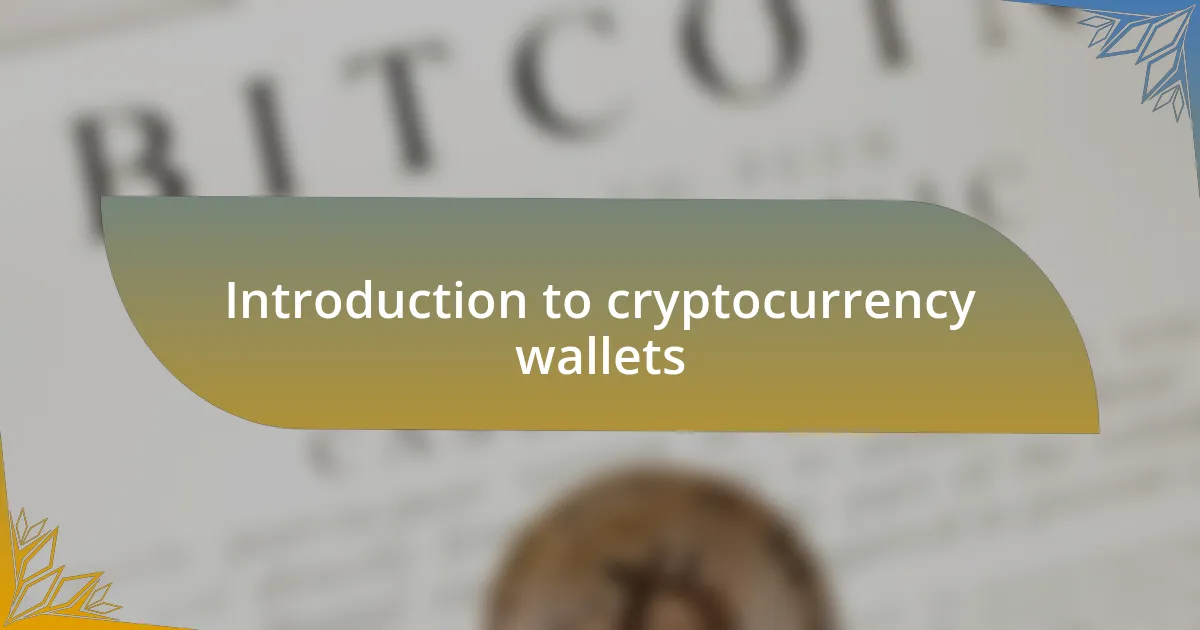
Introduction to cryptocurrency wallets
Cryptocurrency wallets serve as essential tools for managing digital assets, acting much like traditional wallets but in a digital form. When I first started exploring cryptocurrencies, I was surprised to discover how these wallets not only store my tokens but also provide a foundational layer of security. Have you ever thought about how vulnerable your funds might be without a secure storage solution?
There are several types of wallets available, each designed to meet different needs and preferences. I remember my initial confusion when deciding which type to choose—was it a mobile wallet for convenience or a hardware wallet for enhanced security? It turns out, understanding these options can significantly impact your experience in the crypto space.
Having a reliable wallet is crucial as it directly influences how you interact with the cryptocurrency ecosystem. For me, choosing a wallet felt like choosing the safest place to keep my most prized possessions. It’s not just about storage; it’s about trust and peace of mind in an otherwise volatile environment. How can I better protect my investments as I navigate this exciting yet unpredictable world?
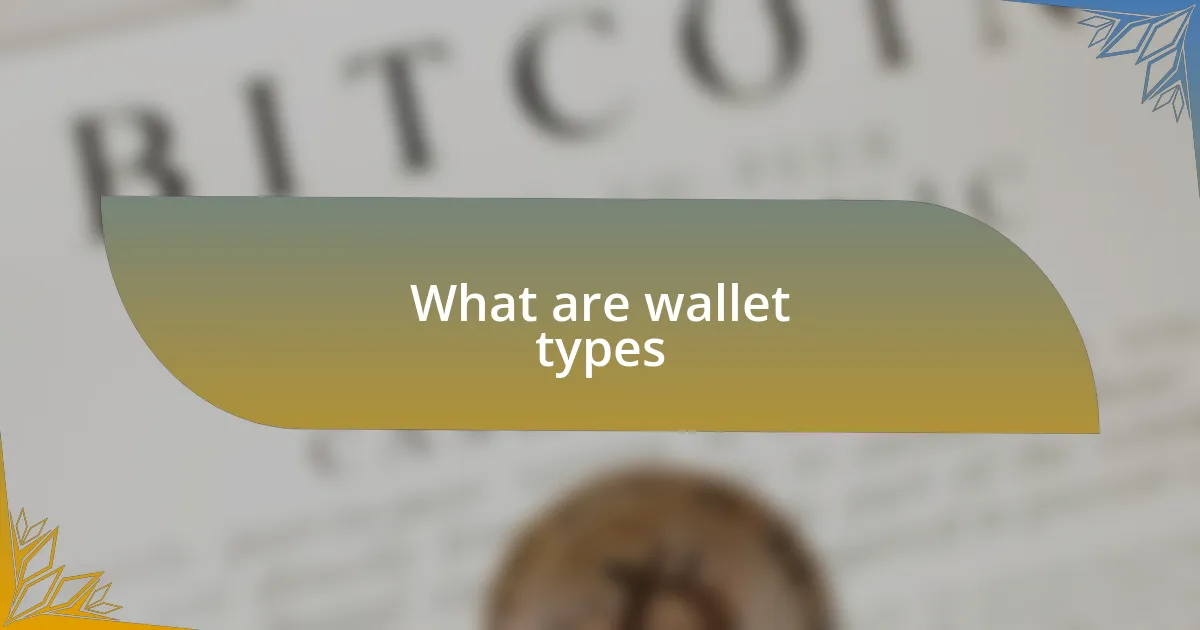
What are wallet types
Wallet types in the cryptocurrency space can be broadly categorized into two main categories: hot wallets and cold wallets. Hot wallets are connected to the internet, offering convenience for everyday transactions but can also expose your assets to potential online threats. I once relied on a hot wallet for quick trades, but the constant connectivity made me anxious about security.
On the other hand, cold wallets, such as hardware wallets or paper wallets, provide a higher level of security by storing your assets offline. When I invested in my first hardware wallet, I felt an immense sense of relief knowing that my cryptocurrencies were safe from hackers. The trade-off is that accessing your funds requires a bit more effort, but for many, the peace of mind is worth it.
Additionally, there are also web wallets and mobile wallets worth mentioning. Web wallets can be convenient for quick access, but I’ve learned the hard way that relying on a third-party provider can come with risks. Mobile wallets, however, struck a balance for me, combining accessibility with decent security; they are perfect for everyday transactions while keeping my assets more secure than typical web wallets. What wallet type resonates with your own experience and needs?
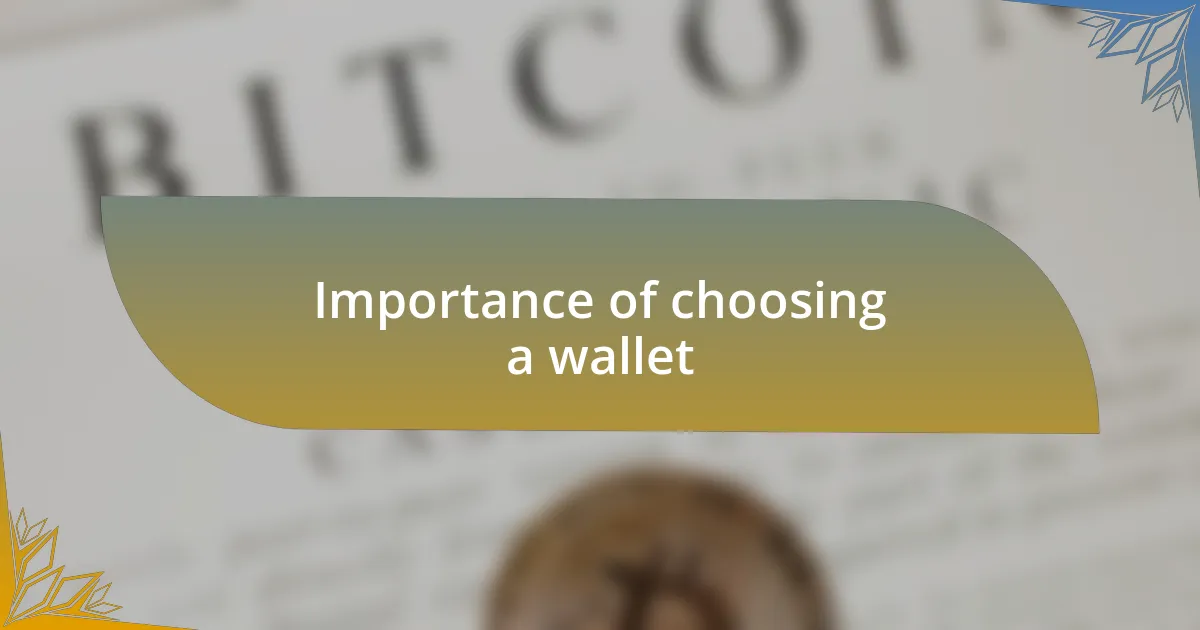
Importance of choosing a wallet
Choosing the right wallet is crucial because it directly impacts your asset security and accessibility. I remember the first time I lost access to a small amount of cryptocurrency because I chose a wallet without fully understanding the recovery options. The experience taught me the importance of selecting a wallet that not only fits my trading habits but also prioritizes security.
The decision also carries emotional weight; when I finally transitioned to a more secure wallet, I felt a huge weight lift off my shoulders. It was no longer just about convenience; it became a matter of trust. How can you feel confident in your investments if you’re not secure about where they’re held?
Moreover, different wallets cater to different needs—whether for everyday transactions or long-term holding. I’ve experimented with several types, and each taught me valuable lessons. Some wallets felt like a safety net, while others felt like a ticking time bomb. What will your choice say about your investment strategy?
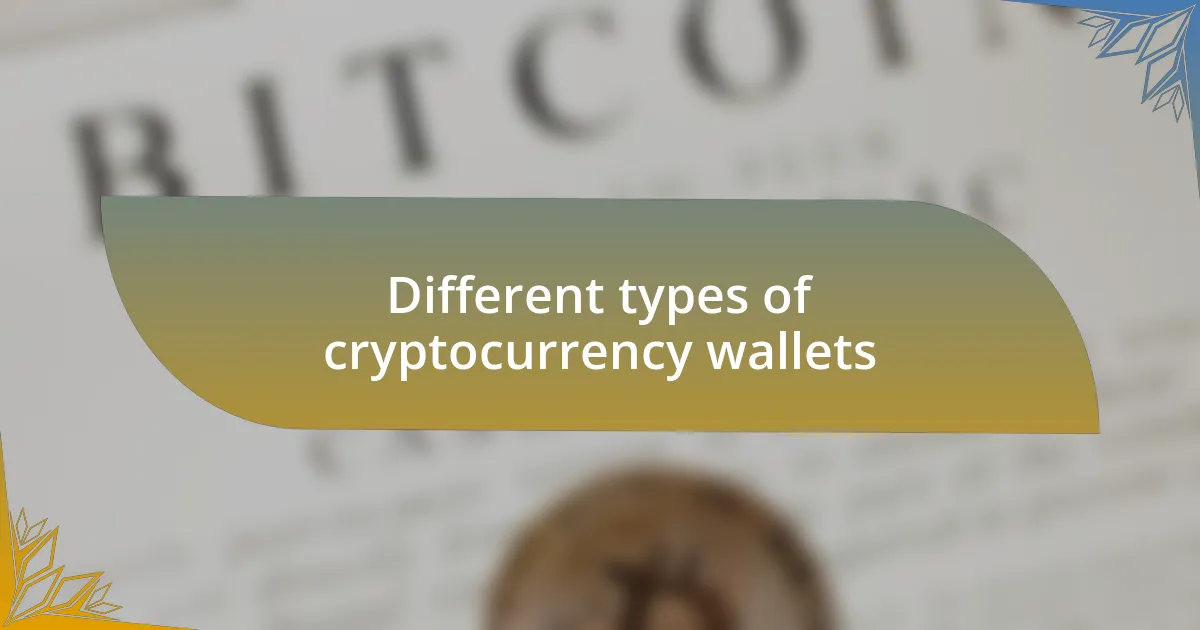
Different types of cryptocurrency wallets
Understanding the different types of cryptocurrency wallets is essential for effectively managing your assets. I’ve used hardware wallets, which resemble USB devices, and can genuinely say that the peace of mind they provide is unmatched. Knowing my private keys are stored offline made me feel like I had a real vault for my digital currency—secure, reliable, and completely mine.
On the other hand, I’ve also tried software wallets, which live on your computer or mobile device. While they offer convenience for quick transactions, I’ve encountered some nervous moments wondering about their vulnerability to hacking. Have you ever felt that flutter of anxiety when making a transaction? It’s a reminder that while they are user-friendly, the level of security isn’t the same as the hardware option.
Then there are paper wallets, which might sound old-school but have their merits. I once created one for long-term storage, writing down my keys and placing it in a safe place. It felt like I was going back to the basics, isolating myself from any digital threats, but it certainly came with its own set of challenges—what if I misplaced that piece of paper? Choosing the right type of wallet ultimately reflects your comfort level with risk and technology.
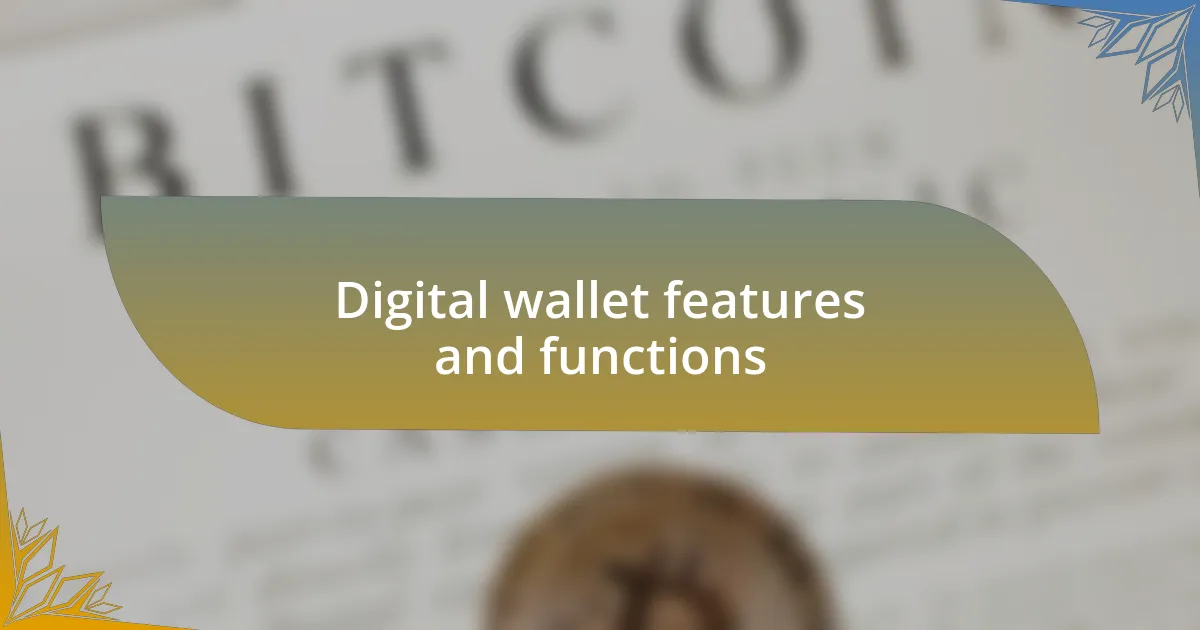
Digital wallet features and functions
Digital wallets come packed with features designed to enhance both convenience and security. One aspect I find particularly useful is the ability to quickly send or receive transactions with just a few taps on my phone. Whenever I’m at a café or a market, tapping my wallet for a payment feels seamless but do I sometimes wonder what happens behind the scenes with my data? It’s fascinating and slightly nerve-wracking at the same time.
Another feature I can’t overlook is the built-in transaction history. Reviewing my past transactions helps me understand my spending habits better. I recall one month where my crypto spending shot up unexpectedly. That insight prompted me to take a step back and reassess my financial strategy—could a little awareness really save me from future impulse buys?
Moreover, many digital wallets now offer extra security layers, like two-factor authentication. I’ve made it a habit to enable this feature because every added layer of protection brings me peace of mind. Have you ever lost sleep worrying about your assets? Making sure my digital wallet is fortified helps me relax, knowing I’m doing everything I can to safeguard my investments.
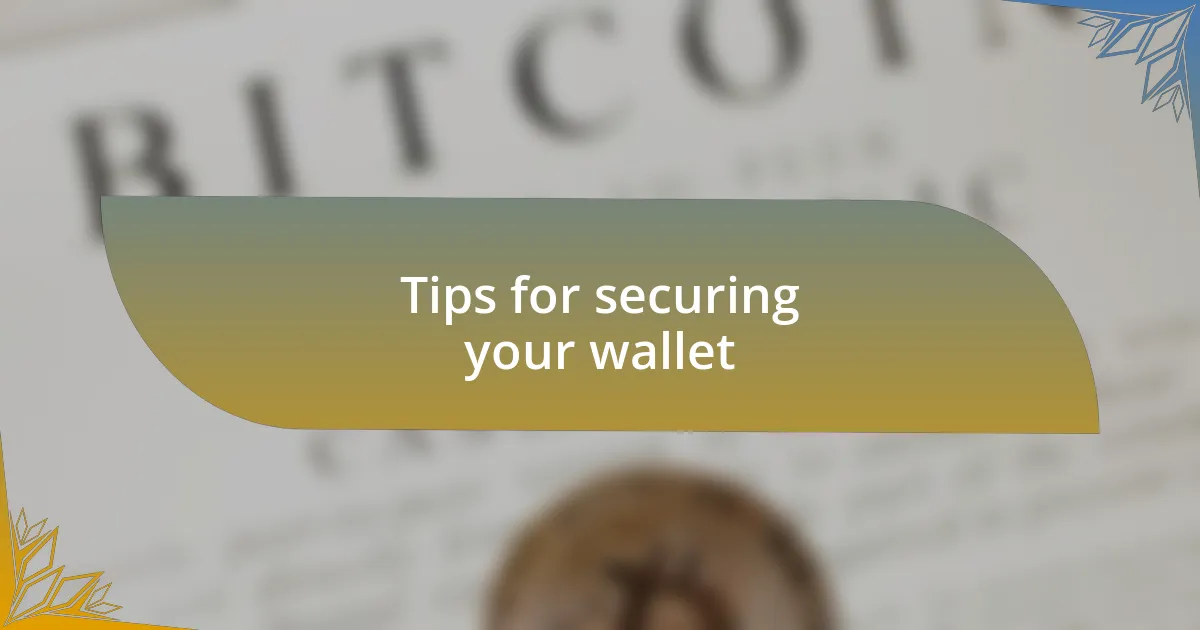
Tips for securing your wallet
When it comes to securing my cryptocurrency wallet, one tip I swear by is regularly updating my passwords. I’ve had moments of panic when I realized how long I’d been using the same password—too long, in fact. I now use a combination of letters, numbers, and symbols, and I change it every few months. Have you ever considered how easily a weak password could compromise your assets?
Another crucial aspect is keeping my recovery phrases or private keys safe and offline. I learned that the hard way when a friend of mine lost a significant amount of crypto because they stored their recovery phrase in an unprotected digital document. Now, I keep mine written down in a secure location, completely disconnected from the internet. It’s a comforting thought, knowing my wallet is extra secure, especially in today’s age of rising cyber threats.
Lastly, I’ve embraced the use of hardware wallets for my long-term storage. Initially, I was hesitant due to the upfront cost, but the peace of mind it brings makes it worthwhile. Have you ever had that nagging feeling of vulnerability? With my hardware wallet tucked away, I feel a lot more confident about the safety of my investments. Investing in a quality hardware wallet is not just about storing crypto; it’s about safeguarding my financial future.